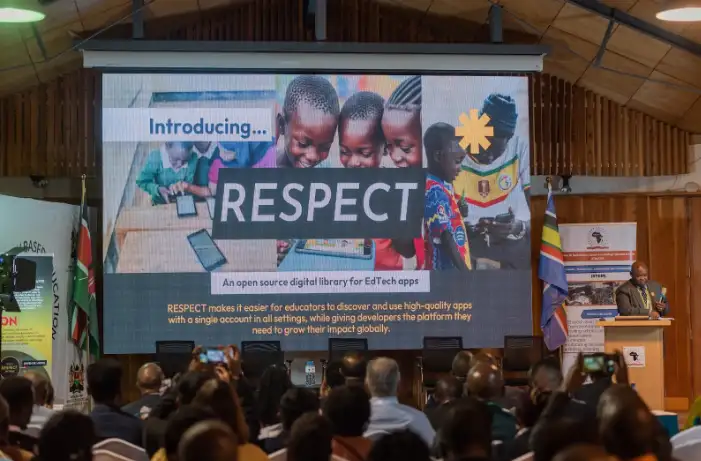RESPECT, a Digital Public Infrastructure (DPI) for Education, was announced last week during the STEMtastic Adventures! Africa symposium. RESPECT was developed by the Spix Foundation to make it easy for Africa’s EdTech stakeholders to embrace AUDA NEPAD’s Africa EdTech 2030 Vision and Plan, announced earlier this month. AUDA NEPAD’s Vision proposes that, by 2030, “every African student should have access to the world’s best interactive digital courseware—developed in Africa by Africans—on smartphones already present in their pockets, households, and/or schools”.
With today’s release of RESPECT Version 1, Africa has gained a multi-year head start over the rest of the world. The United Nations has only this year started talking seriously about the need for a DPI for Education. Africa has already released it. Africa is already ahead. To accomplish the Vision, Africa need only leverage its new advantage to the hilt.
Speaking at the launch, John Kimotho, EdTech Consultant, Spix Foundation and Head of RESPECT Africa Office, said: “Much of EdTech is pilot-driven and disconnected from education systems, leaving developers without clear growth pathways and teachers with tools that don’t last. RESPECT makes it easy for policymakers, educators, and developers, to build solutions that align with real classroom needs and can grow and last.”
“Africa has a unique opportunity to simultaneously drive access to free localised edtech solutions that can reach all parts of the education ecosystem, even those offline, while making it profitable and sustainable to develop the world’s best interactive digital courseware, right here in Africa;” said John Kimotho. “The system has been failing the innovators, not the other way around, and RESPECT makes it easy for those innovators to deliver the education technology solutions that Africa’s children need.”
The scale of market fragmentation
Recent analysis by the mEducation Alliance revealed that developers must navigate different rules, requirements, and procurement protocols in nearly every African country, resulting in what researchers term “small-batch deployment” – a Kenya pilot here, a Senegal district project there, with each requiring complete retooling.
The consequence is a paradox: whilst Africa has produced world-class educational technology – from Kenya’s classroom management systems to Senegal’s Wolof-language XamXam platform serving 1.2 million users – these innovations remain largely isolated within their countries of origin.
“Teachers are experiencing ‘tool fatigue’ from juggling multiple siloed applications with no central access or data integration,” notes the mEducation Alliance’s 2024 report on digital courseware in low- and middle-income countries. “This discourages adoption, even when individual apps are excellent.”
Key problems – and solutions
AUDA NEPAD’s Vision and Plan notes two key problems: (1) the lack of real-time, reliable data about what digital courseware works best for different learners, and (2) barriers to scale including policy, commercial, and technological obstacles.
“AUDA-NEPAD observes that if Africa solves these two problems—by making it easy for courseware to generate real-time data for ranking and research, and by lowering policy, technical, and commercial barriers—then market forces will do the rest,” according to the Vision and Plan.
All RESPECT Compatible™ apps send data on every learner-app interaction to the relevant authority – within the bounds of the jurisdiction’s data privacy, security, and sovereignty laws – enabling that authority to implement data-dependent techniques such as Teaching at the Right Level and Structured Pedagogy. This data, federated at the continental level, enables courseware ranking and research.
RESPECT lowers the aforementioned policy barriers by implementing AUDA-NEPAD’s new Policy Framework for Standards-Based, Vendor-Neutral EdTech, a draft of which was released for public comment today.
RESPECT lowers the technical barriers through the implementation of a range of on-device technologies from data compression, web caching, proxy servers, and mesh networking to make it easy for courseware app developers to write a single app that works online, offline, and intermittently online. Likewise, it has early support for systematic text localization and, eventually, curriculum standards mapping, that are expected to provide easy technological fixes for complex scaling problems. Also, RESPECT enforces interoperability through internationally-standardized APIs such as xAPI, OneRoster, and OAuth.
RESPECT lowers the commercial barriers by providing all RESPECT Compatible™ apps for free to all students and intermediaries, while paying the developers and localizers of said apps based on those apps’ usage (and later, impact). RESPECT’s revenue, derived from sponsorships, will go primarily to these developers and localizers. Think of it as “YouTube meets PBS Kids” for EdTech apps.
For these and more stories, follow us on X (Formerly Twitter), Facebook, LinkedIn and Telegram. You can also send us tips or just reach out on [email protected].
Read: Seven Women-Led Startups Among Mastercard Foundation’s 2025 EdTech Fellowship Cohort



